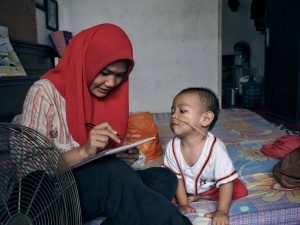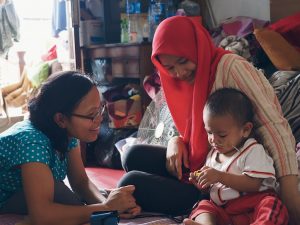We have been truly honoured by the decision of The Elders to name Rachel House as one of their #WalkTogether Sparks of Hope, in the recognition of our “inspirational work” in children’s palliative care. The Elders are independent global leaders, brought together byNelson Mandela, who offer their collective influence and experience to support peace building, help address major causes of human suffering and promote the shared interests of humanity. The #WalkTogetherCampaign celebrates and takes inspiration from the Freedoms that Nelson Mandela dedicated his life and work to: Freedoms for Peace, Health, Justice and Equality. Read the full article below.
MANAGING PAIN AND PROVIDING CARE FOR CHILDREN LIVING WITH HIV AND CANCER
Palliative care is an essential part of any healthcare system. Pain and symptom management and a loving, safe environment are invaluable for people living with serious illnesses and their families, especially children. In Indonesia, however, palliative care is almost unheard of, meaning those living with chronic and terminal illnesses have very little access to the pain management and support that could make their lives more comfortable. There are an estimated 700,000 seriously ill children across Indonesia, but less than one percent currently have access to palliative care or pain relief.
Rachel House was established in 2006 as the first purpose-built children’s hospice in Indonesia. However soon after the unit began caring for terminally ill children, it become clear that after enduring years of pain and invasive treatments, what the children wanted the most was to go home and be close with their family and friends at the end of their lives. So the Rachel House nurses swapped their uniforms for helmets and began to travel the crowded streets of Jakarta to reach these children in their homes. Eleven years later, Rachel House has reached over 2700 children and families across greater Jakarta, and is recognised as the leading voice on children’s palliative care services in Indonesia.
In addition to providing direct care to seriously ill children and their families, Rachel House also provides palliative care training for medical professionals and equips local community volunteers with palliative care skills and knowledge. This is part of their broader mission to build a palliative care ecosystem across Indonesia, which can ensure accessible care and assistance for all in need so that no child will ever have to live or die in pain.

Susi joined Rachel house in 2008 and was part of the first team of nurses trained in palliative care in Indonesia. Amid the steaming heat, and monsoon rains, Susi packs her stethoscope and nurse kit, and heads off on her motorbike. Normally, Susi visits two or three patients a day, spending a few hours with each of them and their families. One of Susi’s typical patients is 9-year-old Rian*, in North Jakarta. He’s HIV positive and lives with his grandmother, his aunt, and her family. His mother died of AIDS four years ago, which isn’t uncommon among Susi’s patients. Susi helps Rian’s grandmother understand his medication schedule and pain management alongside providing essential comfort and support. Patients who don’t have access to anti-retroviral treatment to suppress the HIV virus persistently suffer from other infections, causing symptoms such as diarrhoea, fever, and coughing. This is tragically the case for most children living with HIV in Indonesia; only 17% have access to these life-saving anti-retroviral treatments. The average across the rest of Asia- Pacific is 47%. “Palliative care plays a big role from the point of diagnosis to the end of life.” Susi says. “It’s not only physical, but also emotional, social and spiritual.”

In Indonesia access to pain management is limited. For patients with terminal cancer, it is often vital. One of the cheapest and most effective painkillers recommended by the World Health Organisation is oral morphine. However it is difficult to access because a lot of healthcare professionals aren’t yet familiar with it or how to use it. The barriers to accessing painkillers are also bound up with the stigma surrounding narcotics – a stigma that is prevalent throughout Indonesia. Teaching families and health professionals about pain management is therefore a vital component of Rachel House’s work.
“While the scale of the challenge is enormous, our nurses, community volunteers and staff are passionate, committed and dedicated to provide care for those in need. Because every child, no matter their race, creed or illness, deserves to live free from pain and with joy and dignity,” said Rachel House founder Lynna Chandra.
Ms Chandra said that Rachel House was determined to build an Indonesia-wide palliative care eco-system. “To help nurture the spark of hope into a brightly burning flame of joy, we are determined to educate medical professionals across every part of Indonesia to provide palliative care – because no child should ever have to live or die in pain,” said Ms Chandra.
*Name changed